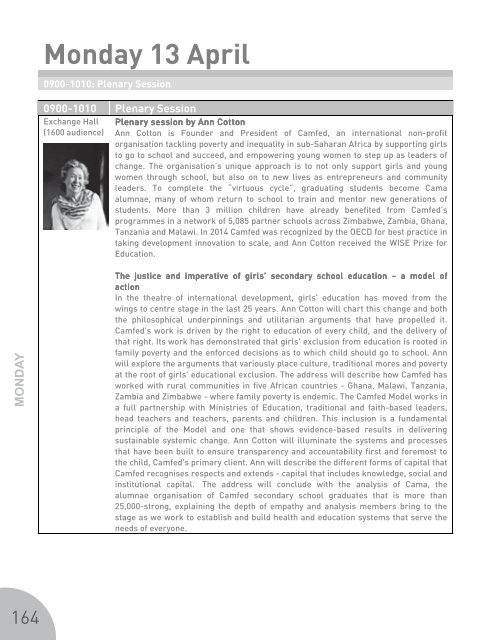You also want an ePaper? Increase the reach of your titles
YUMPU automatically turns print PDFs into web optimized ePapers that Google loves.
Monday 13 April<br />
0900-1010: Plenary Session<br />
0900-1010 Plenary Session<br />
Exchange Hall<br />
(1600 audience)<br />
COTTON’S<br />
PHOTO<br />
Plenary session by Ann Cotton<br />
Ann Cotton is Founder and President of Camfed, an international non-profit<br />
organisation tackling poverty and inequality in sub-Saharan Africa by supporting girls<br />
to go to school and succeed, and empowering young women to step up as leaders of<br />
change. The organisation’s unique approach is to not only support girls and young<br />
women through school, but also on to new lives as entrepreneurs and community<br />
leaders. To complete the “virtuous cycle”, graduating students become Cama<br />
alumnae, many of whom return to school to train and mentor new generations of<br />
students. More than 3 million children have already benefited from Camfed’s<br />
programmes in a network of 5,085 partner schools across Zimbabwe, Zambia, Ghana,<br />
Tanzania and Malawi. In 2014 Camfed was recognized by the OECD for best practice in<br />
taking development innovation to scale, and Ann Cotton received the WISE Prize for<br />
Education.<br />
MONDAY<br />
The justice and imperative of girls’ secondary school education – a model of<br />
action<br />
In the theatre of international development, girls' education has moved from the<br />
wings to centre stage in the last 25 years. Ann Cotton will chart this change and both<br />
the philosophical underpinnings and utilitarian arguments that have propelled it.<br />
Camfed's work is driven by the right to education of every child, and the delivery of<br />
that right. Its work has demonstrated that girls' exclusion from education is rooted in<br />
family poverty and the enforced decisions as to which child should go to school. Ann<br />
will explore the arguments that variously place culture, traditional mores and poverty<br />
at the root of girls' educational exclusion. The address will describe how Camfed has<br />
worked with rural communities in five African countries - Ghana, Malawi, Tanzania,<br />
Zambia and Zimbabwe - where family poverty is endemic. The Camfed Model works in<br />
a full partnership with Ministries of Education, traditional and faith-based leaders,<br />
head teachers and teachers, parents and children. This inclusion is a fundamental<br />
principle of the Model and one that shows evidence-based results in delivering<br />
sustainable systemic change. Ann Cotton will illuminate the systems and processes<br />
that have been built to ensure transparency and accountability first and foremost to<br />
the child, Camfed's primary client. Ann will describe the different forms of capital that<br />
Camfed recognises respects and extends - capital that includes knowledge, social and<br />
institutional capital. The address will conclude with the analysis of Cama, the<br />
alumnae organisation of Camfed secondary school graduates that is more than<br />
25,000-strong, explaining the depth of empathy and analysis members bring to the<br />
stage as we work to establish and build health and education systems that serve the<br />
needs of everyone.<br />
164


